- Latest articles

Turn on the faucet and water comes out; Flip on a switch and the light goes on; Open the cupboard and find food there! It’s so easy to take things for granted.
Giving thanks is an important habit to cultivate. In 1 Thessalonians 5:18 Saint Paul says, “In all circumstances give thanks, for this is the will of God for you in Christ Jesus.” Why does the Lord want us to give thanks in all circumstances? Saint Paul says that the result will be that “the peace of God that surpasses all understanding will guard (our) hearts and minds in Christ Jesus.” So if you find yourself agitated, worried, anxious, lacking in peace, a very good remedy is to start thanking the Lord for things.
I learned some important lessons about gratitude on a walking pilgrimage I went on some years ago. A friend and I set out to walk 180 miles of the Camino de Santiago in Spain. On one of the days we walked about 15 miles and were very ready to stop. Tired, dusty, and hungry, we decided to stay in the next town. However when we got there, we discovered that a big wine festival happening in the area had taken all the available rooms. Not what we wanted to hear!
We were exhausted and needed somewhere to sleep that night. After stopping at several more lodgings that were at full occupancy, we were getting desperate. Then someone told us about a place right outside of town that might have space. The man was nice enough to call ahead for us and indeed, they had two beds left in a public dorm. We had to walk another mile or so to reach it, and when we arrived we found the place was dirty and crowded, but we were so grateful for a bed and shelter that we didn’t care or complain. It sure beat sleeping outside on the hard ground with no roof over our head.
The next day we walked by a bus station and saw many African refugees waiting to catch buses. What were they escaping? How far had they travelled? We could only imagine the pain and suffering they had endured to reach Spain, and our hearts filled with compassion and empathy for them.
Reflecting on this experience, I asked myself, “How often have I thanked God for a bed to sleep in each night?” Not often enough, I realized. The possibility of being deprived of something I usually take for granted, then seeing others in a much worse situation than I have ever been in, made me focus on my blessings and kept me from complaining. My heart felt lighter and more joyful. That led me to thank God for other gifts He has blessed me with, like water.
My friend and I also grew to appreciate the gift of water on the pilgrimage. On the Camino you carry water with you in your backpack, and water is quite heavy. But there are stretches along the way where there is no water source available so you need to carry a good supply with you. More than once, we ran low and even ran out of water, and oh how grateful we were when we found a place to refill our containers and quench our thirst. One of the best parts about stopping at the end of the day was the refreshing shower we could take at the hostels we stayed at.
Returning home from the pilgrimage, we wanted to retain the habit of giving thanks. Instead of waiting to be deprived of something before we appreciate it, how much better it is to be grateful every day for simple things, for things we usually take for granted. God deserves our praise and gratitude, and when we look for the blessings in our day and give thanks to God for them, the problems and worries that we carry feel lighter and God’s presence and provision come into focus.
Gratitude really is the door that opens us to the “peace that surpasses understanding.” Give it a try. What can you thank God for right now?
'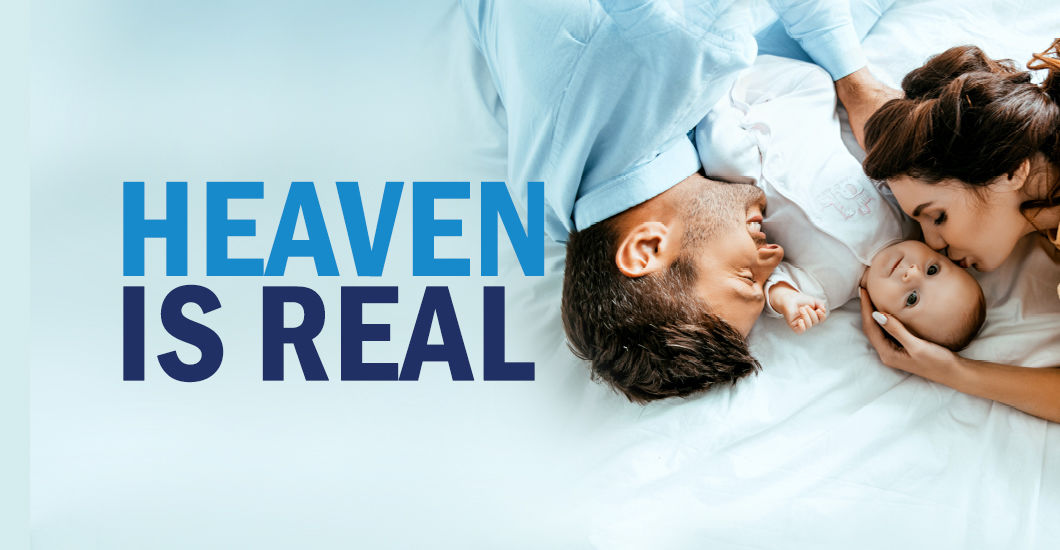
It’s no easy task to bring up children in faith. Lots of surprises await those who really try!
Bubbling Joy
“Children come into my life with their laughter and their song.
When will I become like them? Teach me Lord to sing along.”
Whenever I sang these lyrics from the song “Living waters flow on” my heart longed for children of my own. As an only child I was always drawn to children and nothing could beat the joy I experienced in their presence. As a matter of fact, I chose the vocation of married life to have the privilege of bearing bubbling bundles of joy.
I remember writing in my diary about the songs I would teach them and the Saint stories I would tell them. I yearned to nurture my little ones in the way of holiness, teaching them to love Jesus and Mama Mary with all their hearts. I even bought a children’s Bible storybook before my wedding. From the very beginning of my first pregnancy, my heart was stirred to surround my little one with prayers and songs of praise to God, as I made numerous sign of the Cross over my womb. Being put on bed rest only doubled my fervor to pray more. I never suspected that God planned to bring my baby into the world at 27 weeks of pregnancy. When I held my first-born daughter in my arms, my joy overflowed into hymns of praise. Even as she spent her first 45 days strapped down in the NICU with needles and cannulae in her body I rejoiced in the gift of my daughter.
I spoke constantly about Jesus to my little Anna. Even though I had only a few minutes with her each day, I never forgot to trace the sign of the Cross wherever I could find her skin free of plaster and tubes, whispering that she was not alone and that Mamma Mary and Jesus were right beside her. Sometimes when I hummed a hymn for her, the nurses sang along and the NICU turned into a house of prayer. When I could finally take my baby home my joy knew no limits.
Through the Tears
About three months later, we came to know that our little Anna would be unlike other children. In addition to physical disabilities, her intellect was severely affected. The doctors said her brain was shrunken due to lack of oxygen during birth. I kept praying and singing hymns for her. Strangely, though she never looked me in the eye, there was a joy on her face that was contagious. Whenever I recited the Holy Rosary, all her whimpers and cries turned to peaceful bliss. It felt like we were surrounded by angels who prayed along with us. I never got tired of telling her Saint stories, not knowing if she understood any of it. There were days I wept while praying the Rosary with her, wondering if little Anna ever would be able to pray with me.
Four years went by and three miscarriages added to our pain. The doctors said it would be impossible for me to have healthy babies.
It would take a miracle! In His infinite love and mercy God blessed us with two cherubs, Issa and Aaric—two years apart. Now my little Anna is 6 years old with a little brother and sister to join the ranks of her crying symphony.
After the births of Issa and Aaric I returned to praying and singing just as I had with Anna. But I couldn’t get the spiritual vibe which had been so strong around Anna. When I tried to bless Aaric with the sign of the Cross or tried placing my hand on his head, he would flee like a vampire at the sight of a Cross; Issa would simply stare at me and blink as if to say “Are you serious?”
It was painful to realize that bringing up children in faith is no easy task after all!
You might think it is a joke that I worried about the faith formation of a 2-year-old and a 5-month-old baby. No joke! I seriously began to ask myself, “Am I doing it right? Are they moving away from Jesus rather than toward him? Am I too compulsive in trying to teach them to love God?
My Heart Skipped a Beat
One evening, as I pondered these questions while baby Issa was drooling over a teether, Aaric climbed onto the bed, stretched his hand toward a framed scripture quotation hanging on the wall, and then moved his hand to baby Issa’s lips. Suddenly it dawned on me. He gets it! I regularly bring Aaric to our image of the Sacred Heart of Jesus, place my hand on the image and then touch his lips. I realized that Aaric was not only imitating my gestures, he understood that what he touched on the wall was no ordinary picture but something Holy. I was reminded of Jeremiah 15:16
Your words were found, and I ate them,
and your words became to me a joy
and the delight of my heart;
for I am called by your name,
O LORD, God of hosts.
From that incident I got the clear message that I didn’t have to stress about my children’s faith. In fact, my children would be teaching me about faith.
When the children constantly cry for my attention and won’t let me out of their sight I remember how often I try to get God’s attention and make him look at me. I’m forced to ask myself, “Am I as persistent in trying to be close to Him all day as my children are in getting close to me?
When I discipline my son for his mischief, he never wastes a second before coming to hug me and make peace. But when I’ve made a nasty comment or overreacted in some way, how soon do I turn to God to ask forgiveness? God too disciplines us and then waits for us to hug him and make our peace.
If I love these children who contantly create such messes for me to clean up, then how much more must God love us even when we make our own messes?
Impenetrable to the Eyes
Sometimes while watching adoration streamed on live TV I glimpse Aaric raising both his arms and baby Issa swaying to the songs of praise. I realize that our children imitate our expressions of faith. I know that no matter how well I speak of Jesus or try to inspire them with stories of Saints, what they look at most is what I do. Am I gentle and humble like Jesus? Do I love those who don’t love me as Jesus instructed? As they grow, children are more aware of what we do than what we say.
I am always fascinated when my little Anna turns up during Holy Mass. She is always peaceful. While at Holy Mass, her usual thrums that turn into her high-pitched glass-breaking screams are completely absent. Such is the vigil she keeps. At the point when the priest says, “And so, with Angels and Archangels… with all the hosts and Powers of heaven, we sing the hymn of your glory, as without end we acclaim: Holy, Holy, Holy Lord God of hosts…” little Anna’s big bright eyes dart about as if watching flying objects. She gets excited and her countenance turns so celestial that one look at her would convince you that Heaven is real. The ecstasy on little Anna’s face convinced me that the angels and Saints are with us celebrating Holy Mass like a real party.
My children remind me of the words of Jesus, “…unless you change and become like children, you will never enter the Kingdom of Heaven.” Let us then with great simplicity and child-like faith offer our prayers which will pierce the clouds and reach the Heavens.
'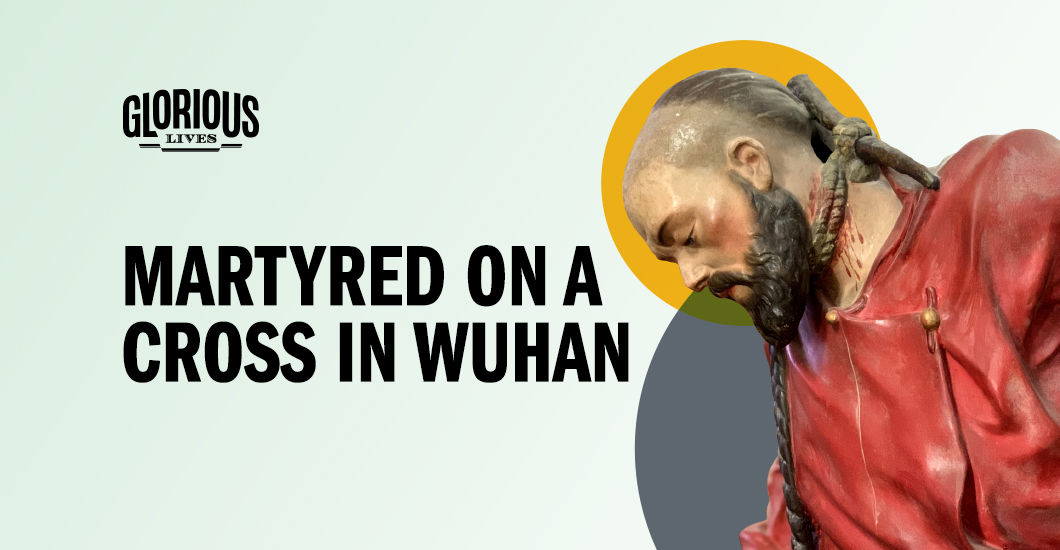
Wuhan, China is notable for more than being the epicenter of today’s Covid-19 pandemic. It is also the site of the martyrdom of China’s first canonized Saint who died by suffocation while hanging from a cross in Wuhan. Many missionaries traveled to China in the 19th century with the knowledge that they would never return. Among them was Father Jean-Gabriel Perboyre, a Vincentian missionary from France. In a letter he composed during his journey to China he wrote, “I don’t know what awaits me on the path that opens before me: without a doubt the Cross, which is the daily bread of the missionary. What can we hope for better, going to preach a crucified God?”
He soon joined the Vincentians helping to rescue abandoned Chinese children and educate them in the Catholic faith. He was arrested in 1839 under an edict that banned Christianity. Tortured and interrogated for months, in 1840 he was finally tied to a wooden cross and suffocated to death.
He was beatified in 1899 by Pope Leo XIII. Saint Thérèse of Lisieux had a special devotion to Father Perboyre and kept a holy card dedicated to him in her personal prayer book. Saint Jean-Gabriel was canonized by Pope John Paul II in 1996.
Among the torments endured by Saint Perboyre were beatings on his lower back and kneeling on broken glass. But this Holy man died because hanging from a cross made it impossible for him to breathe. How fitting it is to seek intercession for those suffering from Covid-19 from one who experienced some of the agonies associated with the disease.
Here is a prayer written by Saint Jean Gabriel Perboyre shortly before his death:
“O my Divine Savior, Transform me into Yourself. Grant that I may live but in You, by You, and for You So that I may truly say, with Saint Paul, “’I live—now not I—But Christ lives in me.’”
'
My mom should have been resting peacefully, pain-free, in a hospital bed; but her final days reflected how she lived her entire life.
It was the last day of my best-loved month, October. I was hurriedly dressing my small children in their costumes for an evening at my parents’ house. My mother had been diagnosed with cancer the year before, and her time on earth was nearing an end. The hospice nurse was sure that my mother had only days left before the aggressive cancer conquered her delicate, little frame.
This news was unfathomable. Three days earlier, I had witnessed her alert and engaged as always—repairing broken rosaries and making dinner for my father. That was my mother. She was a wonderful example of selflessness and love. Everyone who knew her called her a living Saint. By her beautiful example, she taught us all how to take up our crosses with trust and hope. Because of a life well lived, my mother was not afraid to die. Her devotion to her faith and dedication to the Holy Mass and Our Lady’s Rosary was inspiring. Saint Teresa of Calcutta once stated, “A life not lived for others is not a life.” And my dear mother truly lived these words.
Rushing into my parents’ house that evening, I made my way to my mother’s small, dark bedroom. I found her lying in bed, appearing to be asleep and surrounded by my siblings. Grabbing my hand, my sister explained that a few hours earlier, my mother had gone to lie down because she wasn’t feeling well and had fallen into a coma-like state. She could no longer communicate. She had spent the day preparing food for the family gathering that evening when she should have been resting peacefully, pain-free, in a hospital bed. Her final days, her final actions, were exactly how she lived her entire life—emptying herself in caring for others. She was a living example of self-sacrifice.
My mother never complained about the debilitating, relentless pain, nor did she complain about the draining cancer treatment, or even the fact that she was given this tremendous cross at all. My mother, with the faith and grace she lived her entire life, accepted all without question—gladly offering up this cross to God.
For twelve continuous hours, I stayed by my mother’s side—unable to leave her in her time of suffering. My mother did not want to die in a hospital, and I couldn’t help but think to myself how merciful the Eternal Father was in allowing her to pass peacefully, in her own home, surrounded by her husband and all ten children. As the hours of my mother’s passing slowly dragged on, we prayed the Rosary one last time together as a family, just as we did growing up. We watched with tearful eyes as our parish priest gave her the Anointing of the Sick for the final time. We took turns sitting at her bedside, thanking her for being such a perfect example for us in truly living her faith with absolute trust in God’s plan. We all knew that although my mother accepted this cross and was ready to enter the Heavenly Gates, her heart was hurting at the thought of the pain we would endure with her passing. However, after her diagnosis she confidently assured us that she would be of more use to us in Heaven than she could ever be on earth—and I have never doubted it.
Completely unable to communicate, my siblings and I noticed that our mother would move her fingers ever so slightly in front of her mouth—as if gently batting away my brothers when they tried to administer pain medication. It was unmistakable. Looking at each other with tears in our eyes, we finally spoke aloud what we had all been thinking. She wants to suffer and she’s offering it up for us.
The night slowly turned into day, and as we all fought to stay awake, we noticed my mother’s breathing slightly changed. Gathering around her in the small bed where she lay, we said our final goodbyes, promising her that we would take care of each other here on earth, so she could go home to Heaven peacefully, where her dear daddy and grandbabies who were taken too soon, were waiting for her. I watched with a heavy heart as she drew her last breath. All twelve of us, filling the small, cramped bedroom, fell silent. I quietly whispered, “Our Mom has now seen the face of God.” At that moment, I stopped praying for my mother and began praying to her. It was All Saints’ Day. What a welcoming she must have had!
'
Amidst the plethora of assignments and tests at University, she kept aside her time to serve the Lord. Wanna know how God rewarded her?
Make a Wish
I discovered the U.S. Presidential Scholars program when I was in middle school. Every year, 161 American seniors were recognized for their outstanding achievements with one of the nation’s most prestigious awards. Looking at the scholars, I thought that they represented an unreachable pinnacle. However, every night for the next four years, I mentioned this program in my prayer intentions. I didn’t necessarily think I was worthy of the honor, but I’d made a habit of asking God for all of my wishes since I was a child. My parents used to laugh when I mentioned the Presidential Scholars at family prayer; no one was more shocked than us when the Lord granted this particular request.
In my family, my mother modeled a relationship with Jesus that was full of affection, honesty, and freedom. God ought to be told of all my plans and intentions, and I was to insist on His opinion for everything, my classes, college, career choice, even the extracurricular activities I participated in. In addition, my parents made sure to take our family to retreats once or twice a year. Throughout my teenage years I received a great deal of consolation, grace, and support from Shalom, Sehion, Steubenville, and other ministries. Regardless of my feelings at each program’s start, by the end I was given the blessing to take lovely things into my heart.
Stepping In
In school, I grew very concerned about the wellbeing of my friends. It was obvious that my upbringing was defined by truths and flourishing with blessings that my peers had never had the opportunity to receive. Even when I couldn’t tell them much about God, I told God often about them in front of the tabernacle. My family attended daily Mass whenever possible and visited our parish on days it wasn’t. In this way, I brought to Jesus my team members, teachers, and especially those who upset me. Their struggles were intensely real, occupying the present moment. In these little conversations, I developed a greater desire to work for evangelization not sometime in the future, but now.
I’ve helped my parish every week since I was seven, singing in the choir, serving on the altar, reading, or teaching. My home is only two minutes from church; I am an “on-call” volunteer, stepping in whenever needed. Through retreat opportunities, especially the Shalom Media Summit, I became more active on a broader scale. With my high school activities, I was already extremely busy when I started volunteering for Shalom. Regardless of my overload, I prioritized any work done for God. I wasn’t able to commit to a schedule, so I gave what I could. During my lunch break I might edit a few sentences for a media post. After my homework I could revise presentation scripts. I even skipped several school days and evenings to assist with Jesus Heals programs and accompany my mother to Victory conferences.
By helping out in areas I enjoyed, I spent time that would otherwise be less fruitful. I was also very particular regarding the quality of my work. In clubs, I took great care when preparing anything for the students I mentored—how much more should I do for my Jesus who loves me? Sharing at least a portion of the graces I had received was my responsibility, but I was rewarded for it. Any assignments or tests I couldn’t prepare for were always postponed or made easy. Once I had a national scholarship application due on a First Friday. The day prior, I was very upset, as I had so much left to write that I was sure to miss my monthly adoration time. Friday morning, program officials extended the deadline by three days. The Bible says that even a glass of water given in the name of the Lord will not lose its reward. How much more valuable is our time? I thought that I was doing something for God, but He was marking every second, using that time to do great things for me.
Prudence Pays Off
Yet, there is more to service than the work done alone. In social settings, we must remain aware of occasions that may influence us to compromise our beliefs. A particular hurdle for students are the trips necessary for club involvement—a crucial part of college and scholarship evaluation. Meetings, conferences, and teambuilding sessions presented me with many stressful situations. Small actions—like avoiding certain music, games, and outfits— formed a barrier between me and my peers. Although the school trips were fun and competitively successful, it was difficult to assure students that I wasn’t judging them for their choices, which were acceptable by our chaperone’s standards. Listening to my conscience even eighty percent of the time was an isolating effort. Yet, on a summer retreat I heard in my heart repeatedly, “I AM YOUR FRIEND.” These emphasized words were extremely significant to me in the school years that followed. Jesus is a personal friend to every Christian; the hard part is being a true friend to Him.
My favorite strategy is to assign the Lord responsibility for everything. Saint Joseph of Cupertino has received notifications of every examination that has come my way, and my mother has prayed in church during each of my testing sessions. While preparing for school competitions, I would ask God what I should write; while presenting to judges I would remind Him to tell me what to say. When starting projects or essays, I brought my notes before the Blessed Sacrament in adoration and jotted down ideas from there. Even for this piece, only a light weight remains on my shoulders—someone else wrote the outline!
Opportunity Knocks
God Himself will make everything possible, as He did for me. For students to enter the presidential scholar selection process, they must be nominated by a state education official. I needed to be among the ten students recommended by mine, but I was from a region unconnected to any state student initiatives. I had found no opportunity at my rather unknown high school to personally connect with my representative. Yet, last year, a new superintendent was voted in who particularly focused on expanding student access to opportunities. She began accepting applications for nominations online, an unheard of change that came just in time for my graduating class. With her recommendation, I was made eligible for the honor God eventually granted me. As servants, we are called to be attentive to the opportunities the Master gives us, not to worry about how they’ll arise.
If we nurture within ourselves the passion to serve, God will provide us with even more chances to do so—He even rewards us for them! Under His direction, we are empowered to do things we could never think to manage on our own. Our Father will not let His children down, especially when we leave the outcomes of our efforts to Him. Our job is to say ‘Yes’, and watch God say ‘Yes’ back to us in ways miraculous for our own life situations. Though our gifts may be small, we offer them to a God who uses five loaves to feed over five thousand.
Let us give Him the opportunity to manifest His glory.
'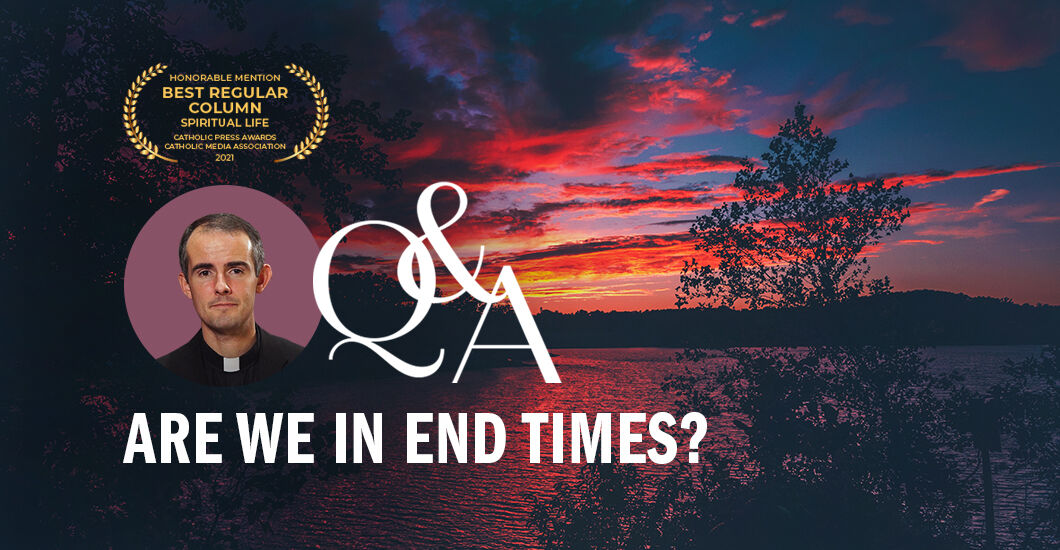
Question: It seems like this year has become crazier and crazier. Every time I turn on the news, a new disaster has befallen us: the virus crisis, racial unrest, a struggling economy. All of this bad news makes me wonder: are we in the End Times?
Answer: Are we in the “end times”? That is a question that has been asked in every age. But we believe, as Christians, that human history is not just a series of meaningless, random events, but that we are part of a Larger Story— one that is being written by God and accomplishing His purposes.
Every story has a Beginning (Creation & the Fall), a Middle (Christ’s Incarnation and Paschal Mystery), and an End (Christ’s triumphal return). So are we in the End? we are certainly well past the middle historically—about 2,000 years past the middle—which is about how far Abraham was from Christ. The question that no one knows is how close we are to the end—it could be a year, five years, a hundred years, a thousand years. But “The End” is not just a moment, it is a process. In a sense one could trace the beginning of “The End” back to the 1400s with the rise of the Renaissance, because it was a system that began to take the attention off God and put it back on Man—seeing the creature without a relation to the Creator.
Picturing ourselves in “The End” is, to me, just situating ourselves in the Larger Story. We talk about the mundane and the boring. Our lives are full of mundane, boring things. But not unimportant things. I will never forget what my sister said to me one day many years ago. We were driving home after we had just seen the first Lord of the Rings film in a movie theater. As we looked out at a brilliant sunset she sighed deeply saying, “Oh, I wish life could be like that! An epic quest, a thrilling adventure!”
I have often used her quote in talks that I have given, because I think she had a profound insight into the human heart. Human beings want to know that their life is not just a random chance accident, that our presence here on this planet isn’t just unnoticed and unimportant. This desire of the human heart was placed there by God, because we do play an irreplaceable role in a grand epic—the epic of Salvation History.
So those mundane, boring tasks, when seen through that lens, take on monumental significance. Consider: when you clean a dirty diaper or make dinner for your kids, you are taking care of the physical needs of immortal souls who will someday spend eternity in an eternal triumph of glory or an everlasting tragedy of horror. These immortal souls in your house will someday either advance the Kingdom of God here on earth, taking back ground for the King, or will participate in the Kingdom’s further destruction. All of the mundane tasks that we do have ramifications in history and into eternity. We are part of an epic tale, a battle between good and evil, which is fought in every soul, in every home, in every nation, in every age.
And so I do find it spiritually helpful to be aware of what role we might be playing at this critical juncture in history. One thing that such reflections have taught me is that much of the stuff I worry about on a daily basis won’t matter in the grand scheme of things. I mean, that traffic jam, that jaywalker that anxiety about money; will it matter if the end is near? Because, after all, whether or not the end of the world is near, the end of my world is near and guaranteed. It’s just a memento mori (remember your death) writ large, I think. It helps me to remember that life is bigger than my petty worries and that I have to focus on what is truly important—being ready when Christ comes for me.
As a priest, I have always been struck by how much our liturgy talks about Christ’s Second Coming. I never really noticed it until I started celebrating Mass, but all of the Eucharistic prayers and the Memorial Acclamations—and even much of the New Testament—is all about awaiting His return. We are an eschatological people, always looking for the culmination of all things.
The redemption Christ won through His death on The Cross is ongoing, or we might even say unfinished. Not that Christ has to add anything to it, but sin continues to multiply despite the tremendous outpouring of grace. The Cross allowed us to be reconciled to God, if we respond to His grace—but He has not yet exercised His full dominion over creation. The dominion is His, but He awaits the fulfillment of all things in order to display His full might and power. That is why the Church has cried in every age, “Maranatha! Come, Lord Jesus!” As Catholics we are all longing for that day when His redemption will be complete, when “the last enemy to be destroyed is death” (1 Corinthians 15:26).
As we await that final victory, Christ calls us to be vigilant and to observe the signs of the times. Every age has had to wrestle with the question, “Is the end near?” Our age is no different. And so, prophets and wise men and those who have the mind of Christ would do well to continue to discern that question. I do think there are some fundamental differences between our age and the ages past, but every person in every age is called to discern wisely the signs of the times.
Although we can’t draw any solid conclusions yet, we should always prayerfully consider the evidence in geopolitics and the philosophical winds that blow. I think it can be quite helpful, spiritually. Scripture constantly reminds us to be vigilant and watchful, keeping our spiritual eyes open.
Rather than taking us away from the duties of our state in life, consideration of “the end” can help us to perform them with more diligence, knowing that if we are half-hearted or sleepy, the Bridegroom will return and leave those foolish virgins outside. If I (wrongly) believe that my life is just full of boring, meaningless things, or that Christ’s coming is so delayed that I will always have time to repent and draw close to Him, then He will arrive like a thief in the night. This is true not just for each individual but for the world as well. Is the Church ready? Is the world ready? If not, what do we need to do to prepare ourselves for His coming?
'
It is those hard days which teach you. Be brave enough to sit alone and know that you are never alone…
The phone remains silent. The doorbell is untouched, no longer ringing to announce a welcome visitor. Friends and family seem distant, preoccupied with their own needs. It’s no wonder that I stare at the refrigerator more these days hoping its contents will bring comfort. Even when I fill the day with chores and hobbies, they can feel devoid of meaning. Have you ever regarded the day with despair and fed that feeling until you’re filled with sadness or worry? Many of us do these days. Even in the best of times, loneliness is hard to deal with, but, as the entire world battles the Covid-19 pandemic, loneliness can grip any of us when we’re most vulnerable. So, what are we to do?
Everyone’s circumstances are different. However, whenever I feel isolated, I simply walk out of my door and take a deep breath. Sometimes, I only walk 10 feet out the door and other days it’s a nice long walk. It is the act of opening the door that lets air into my home, gives me a different perspective on my surroundings and, even if they’re 6 feet away, seeing another person pass by takes away some of the isolation.
One recent morning, with my Rosary in hand, I went for a walk to refresh my thinking and attitude. The morning happened to fall on a day we pray the Joyful Mysteries of the Rosary. The thought of walking in joy with my Blessed Mother began to make an immediate impact on my attitude. Walking and praying the Rosary has a peaceful rhythm for me and it’s easy to become lost in the meditation. I asked Our Blessed Mother to reveal the joys in each mystery as I contemplated them. Her revelations come in many different forms, but that day it ran right past me.
I reached the final Joyful Mystery where Mary and Joseph find Jesus in the temple. Immediately after announcing the mystery, a woman jogged by. How nice, I thought, that she is taking care of her temple and staying fit. I also wondered how fit her spiritual temple was. As quick as that thought came, the next thought developed: “Reflect on your own temple”. Suddenly, the Blessed Mother asked me: “Teresa, have you found Jesus in your temple today? When you search for Jesus and find Him in your temple, He will bring you joy”
How silly I have been. I’m NEVER alone or isolated. Jesus is ALWAYS with me. Jesus repeatedly says in Scripture that He is with us and will never forsake us. In Matthew 7:7 Jesus tells us to knock at the door and it will always be opened to us. Now, I knock at the door of my temple and look for Jesus. He always welcomes me, shares His joy and changes my thinking and attitude. I pray that you may find that you are never alone either. Search for Him and make Him welcome in your inner temple.
'
Quick: What’s your favorite show? Does it really entice you?
Binge watching TV: a pastime that today sits comfortably high on our list of go-to activities. The only strenuous part is picking that perfect show amidst the plethora of options across multiple streaming platforms. Cross that hurdle and then a single click on “Play” whirls us away to worlds outside our own, far removed from our daily cares.
When hit with the first pandemic lockdown, my husband and I found a show that ticked most of our boxes. Fast-paced and with a great plot, the series was gripping enough to fill the weekends. It was not hard to see how the show had garnered a huge fan base along with high ratings by critics.
As we progressed through the seasons however, we noticed a disturbing trend in the storyline. Practice of the Catholic faith was dissected and twisted and became the activity mainly of the villains, not the good guys. It seemed the underlying intent was to convey this malicious misrepresentation bit by bit, as viewers got more engrossed.
Such attempts to make viewers question their belief in a higher power may not always be obvious. Some content might try to desensitize us slowly to the most basic of vices. A popular comedy I started watching seemed to treat crimes with too much humor. Another trending show centred on human desire to live forever through a virtual avatar, an alternative to the perceived end by death.
Thankfully, we also have those creations that continue to inspire and motivate us—superheroes, love stories, triumphant victories against all odds, valiant struggles for peace and more. Isn’t it incredible how much of an impact can be made by that TV screen? I was happy to find one such show recently only to learn it had not drawn enough viewers to be developed further. Not the first time this has occurred with programmes of this nature.
Perhaps shows that break the norm fare better at sustaining interest. A good old fashioned rom-com or family movie is seldom something we recommend when discussing our latest streaming finds.
Watching thought-provoking content can have its benefits, but the doubts they trigger around our core beliefs can go two ways. Either we draw from our life experiences and Christian teachings to stand firmer in our faith, or we can be drawn to even more questionable content that intensifies our new doubts. The latter can be quite dangerous where youngsters are concerned. All it takes is an appealing and seemingly intelligent character who in the name of social consciousness speaks casual dialogue that derides religion. This can confuse young minds who value social responsibility and might be made to wonder if the Church shares those values.
So how do we become aware of all that’s around us without letting anything shake our core? How do we take only the good from what we watch and discard the evil? Let us pray to our Lord for the gift of discernment. Being mindful that we don’t have to get used to the way we feel after watching something. Inviting family members to share views at the dinner table can lead to a healthier understanding of what supports Christian values and what doesn’t. If something doesn’t, let’s be aware and take appropriate action.
And while we continue enjoying the creativity the entertainment industry has to offer, let’s also focus on and enjoy the sublime knowledge found on the pages of our Bible, the all-inclusive love of our Father, the ultimate hero Jesus, the superpowers of the Saints and the wonder of the everlasting Kingdom. Let us help each other realize how awesome it is to know a God who loves us, died for us, and wants us to be with Him forever. And let nothing come in the way of holding that faith till the end.
“So, let us be rid of every encumbrance, and especially of sin, to persevere in running the race marked out before us. Let us look to Jesus, the founder of our faith, who will bring it to completion” (Hebrews 12: 1-2).
'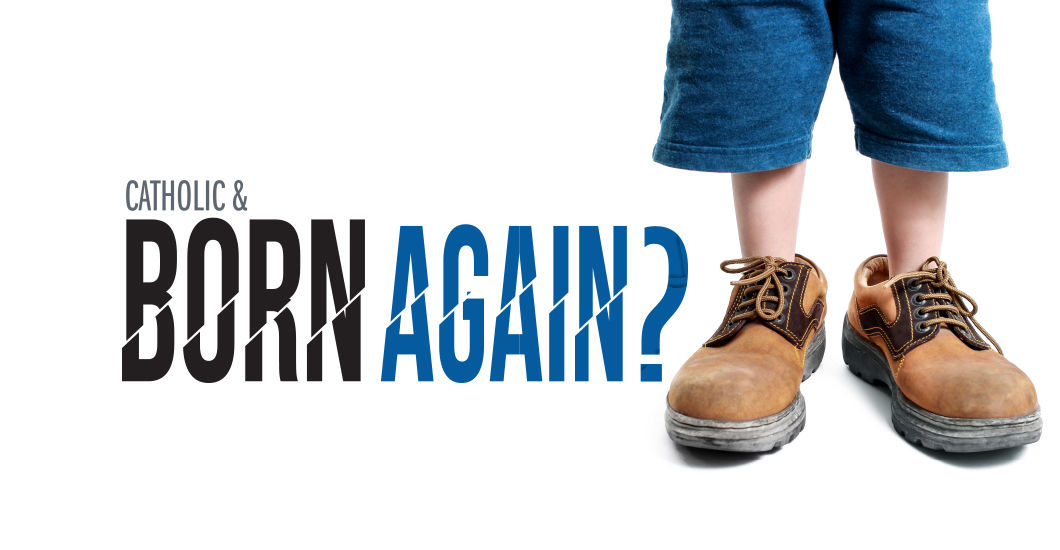
How is that even possible—to be baptised as a Catholic and then to be born again?
Either you are born again at your Baptism when your parents/ godparents invite the Lord into your life on your behalf, as Catholics believe. Or you are born again on the day you accept Jesus as your personal Lord and Savior, as my Protestant brothers and sisters would say. For me and thousands of my brothers and sisters in the Catholic Church, both are true. How can that be?
Chat in the Café
I was born into a Catholic family and reared to be a ‘good’ Catholic boy, serving at the altar, going to Catholic school, learning Catholic prayers, and eventually attending a Catholic university. My faith today is a sum of all those parts. Yet I did not truly have a personal relationship with God until one pivotal day at a café during my university days. During a casual chat, one of the brothers from a Brethren church (visiting India from the States) asked me whether I had a personal relationship with God and whether I would like to accept Christ as my personal Savior?
I asked, “What do you mean? How do I do that?” He replied, “You just have to accept him into your heart/life as your personal Savior by a profession of your faith.” I asked passionately, “But how do I do that and when?” He said “If you are ready, right here, right now.” I reminded him that we were in a café and that Catholics do not do that sort of thing. But somehow I agreed and so, a few of us at the table rose to pray while I officially invited Christ into my life as my personal Lord and Savior. There wasn’t the thunder or lightning or storm from Heaven that I had expected. But my newly found brothers and sisters congratulated me, saying I was now officially ‘born again’.
Although I did not feel anything outwardly or inwardly, later that day alone in my hostel room, I started praying and words of thanksgiving flowed out of me like a river. Never had I prayed like that before. I couldn’t believe my words. I was shocked but soon realised that the simple, genuine prayer I had made at the café a few hours earlier was taken very seriously up in Heaven. And the Lord of Heaven and Earth Himself had made His home in me.
Taste of God
With my newly found love for the Lord and for the group of friends who brought me to this stage, I started going to prayer meetings and took my baby steps in the Spirit. Initially, I almost completely gave up going to Mass as I felt something that I had never found there, at least not until that date.
Then one day, the Holy Spirit spoke in my heart telling me to attend the daily Mass in the hostel chapel. This was a Syro-Malankara Mass of which I had never understood a single word. But I obeyed the Spirit and went to Mass. To my surprise, I understood every prayer and participated in the Mass like never-before. I knew the Lord had brought me back home.
While I continued going to the Protestant service and prayer meetings, I also attended Mass. By the end of my studies, over the next 2 years, I could understand and recite every prayer of the 3 rites that were celebrated, in a language I could neither read nor write. I am now a devout Catholic, not just because of my upbringing, but because I tasted and saw personally that the Lord is good.
I know there are many who haven’t tasted the goodness of the Lord in a personal way and have not experienced the joy of such a relationship. Nor have they known the joy of participating in the Catholic Church with all its richness—the Body and Blood of Christ, the sacramental mysteries, and the Communion of Saints. Not to mention the Blessed Mother!
If you are a Catholic, I invite you this Christmas to deepen your faith by inviting the Lord to come and take control of your life. If you are a Protestant, I invite you to deepen your faith by embracing the Catholic Church and Her teachings and thereby experience the fullness of Christ’s truth and light. If you are neither, my dear friend I invite you to “Taste and see that the Lord is good” (Psalm 34:8). Not just good, the greatest good you can ever hope to seek or find. Merry Christmas!
'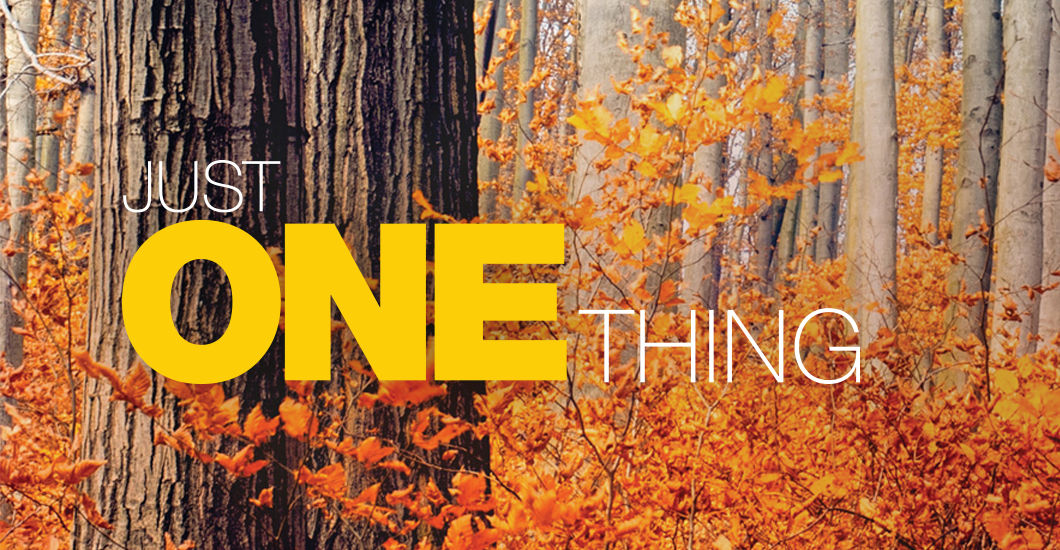
Ever wondered what life is all about? Have you figured it out?
The Secret of Life
The Christian existentialist Soren Kierkegaard once said, “The saint’s life is about one thing.” The Dane didn’t mean that a saint’s life would be a monotonous existence—a “been there, done that” type of lifestyle. Rather, he meant that a truly holy person is in perfect union with the Ultimate Reality.
So, ask yourself: what is your “one thing.”
The 1991 film City Slickers, starring a young Billy Crystal, explores this question in a fascinating, cinematic way. The adventure begins in the heart of New York City, where a thoroughly urbanized, stressed out, and jaded executive is struggling to find meaning in life. His two best friends have the perfect cure: a “fantasy vacation” where they can be cowboys in a real-life cattle drive.
The drive is led by Curly, a delightful, no nonsense, in-your face cowboy played by Jack Palance (best known as the quintessential bad guy in the 1953 Western Shane). On the trail, Mitch (Crystal’s character) is fascinated by Curly, who seems to have his act together, and asks him, “What is life about?”
Curly replies, “None of you city slickers get it. You know what the secret of life is?” He raises his index finger. “What? Your finger?” the perplexed Mitch replies.
“One thing. Just one thing. You stick with that and the rest is rubbish.” (loose paraphrase)
“But what is the one thing?”
“That’s what you have to find out,” Curly responds.
Discover the Hidden Treasure
Have you found out the one thing? That’s the point of Jesus’ parables, The Treasure Buried in the Field and the Pearl of Great Price (Matthew 13:44-49) which focus on the Ultimate Good—the Kingdom of God, which was the theme and content of Jesus’ mission. The Kingdom means a state in which God’s goodness is valued above all else, so His way is followed. We pray in the Our Father, “Thy Kingdom come, Thy Will be done, on Earth as it is in Heaven.” This is the most valuable good, which is made perfectly present in Jesus. How so? Jesus is the Word of God, the Father’s perfect reflective Thought (Logos) of Himself. So, Jesus’ will is always, eternally, congruent with that of His Father. So, if you want to know what Kingdom living is about, listen to Jesus’ teachings and observe how he lived. Jesus is the hidden treasure; He is the pearl of great value. He is the fundamental discovery, who can make a radical sea-change in our lives, filling our hearts with joy.
Sadly, for many of us, the Triune God does not rule over us, because we allow other things to dominate our lives. Pope Francis in his Apostolic Exhortation, Evangelii Gaudium put it poignantly when he said, “The greatest danger in today’s world, pervaded as it is by consumerism, is the desolation and anguish born of a complacent yet covetous heart, the feverish pursuit of frivolous pleasures, and a blunted conscience.” The upshot is that “God’s voice is no longer heard. The quiet joy of His love is no longer felt, and the desire to do good fades”.
Born and Reborn
How can we reverse this trend? We can do what the farmer and the merchant did and seize the opportunity to renew our personal relationship with Jesus Christ. They were given a unique opportunity, which they weren’t going to let slip away. Hence, they sold everything they owned to attain it. Realizing the inestimable value of participating in the Life of Christ leads us to sacrifice, detachment, and renunciation—dispositions antithetical to our consumer-driven culture that is based on having the goods of the world to be happy. He is the treasure that is worth the sacrifice of ever y temporal thing. We must not let this relationship become barren and lukewarm. This is not a matter of disdaining the goods of the world, but using them in His service to love God and neighbor. Everything else should be subordinated to our relationship with Jesus. His Word, His grace is the one thing.
When we make that commitment, what happens? Again, Pope Francis puts it succinctly, “With Jesus Christ, joy is always born and reborn”. When we make the Kingdom of God, perfectly personified in Jesus, the focus of our lives, then the power of his Being enters our soul and our other relationships become filled with His love. Make Him the point of departure for your life and your destiny. Make Him the reason and goal of everything you do. When we “move, live, and have our being” in Christ Jesus, His joy will permeate ever y dimension of our lives. His presence can transform our hearts, opening our eyes to perceive the needs of our brothers and sisters, especially the weakest and poorest.
'
Did you know you have an ever-present father? Read on if you are longing for his love.
When you turn back
Sixteen years ago I was facilitating a catechist class at Folsom Prison, a maximum security prison in California, preparing some of the inmates for Confirmation. An inmate named Juan, was telling his story. He shared that his biological father had abandoned his family when he was an infant and that his stepfather was aloof and abusive. In so many words, he said that his connectedness to a father of any kind was “messed up”. That might be the reason, he said, why he is drawn to his childhood faith–he is still seeking his father.
I said, “Juan, God IS your Father and Jesus invites you to call him ‘Abba’.”
“What does ‘Abba’ mean?” he asked.
“It means ‘Dad’, ‘Papa.’ Jesus gives you permission to call God ‘Papa’,” I said.
With tears welling in his eyes, Juan slowly and reverently recited the Our Father. He said it with such power and conviction that it seemed like he was saying it for the first time.
The simplicity of the Lord’s Prayer and our own familiarity with it can mask what a phenomenal breakthrough it was in the history of religion. Jesus doesn’t address God as ‘Judge,’ or ‘Omniscient One,’ or ‘Great Power in the Sky’, or some other title that that would point to God’s transcendence. Instead, Jesus calls God ‘Father’ which evokes a sense of familiarity, reminding us how a child turns towards his or her father, trusting that they are loved by him.
Filling the void
If some experience their fathers as absent, judgmental, or harsh, it is possible they may project these qualities onto God. If they have grown to expect little of their fathers, they may also expect little or nothing of God. If their father was generally non-communicative, they may project that onto God. But Jesus taught us to call God “Abba” which means “my father” and evokes a sense of intimacy, of warmth, safety, and love.
Such an understanding of God as loving parent can be found in the prophet Hosea, who captures this intimate Father-child relationship that Jesus invites us to:
When Israel was a child, I loved him,
out of Egypt I called my son.
The more I called them,
the farther they went from me,
sacrificing to the Baals
and burning incense to idols.
Yet it was I who taught Ephraim to walk,
who took them in my arms;
I drew them with human cords,
With bands of love;
I fostered them like one
who raises an infant to his cheeks.
(Hosea 11:1-4).
What a tender image of our loving God as one “who raises an infant to his cheeks.”
That’s the image that melted the heart of a prisoner named Juan and filled his eyes with tears. Many people go through life seeking their father. But Jesus tells us we have a father who loves us more than any earthly parent ever could. We simply have to come before him and with the simplicity of childhood say, “Abba!”
Heavenly Father I surrender myself completely into Your hands just like a child, and I trust in Your Divine providence. Each day let me feel those invisible bands of love which draw me close to You. Amen.
'